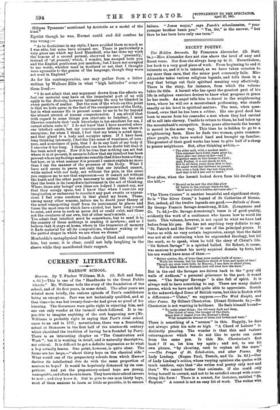C URRENT LITERAT IJRE.
HARROW SCHOOL.
Harrow. By T. Fischer Williams, M.A. (G. Bell and Sons. s. 6,1 )—This is one of the "Handbooks to the Great Public ichools." Mr. Williams tells the story of the foundation of the school, and of its first years, in some detail. The after years are related more briefly, the curious episode of Parr's candidature being an exception. Parr was not technically qualified, and at that time—he was but twenty-four—he had given no proof of his learning. The Governors were quite right in rejecting him, and one can only wonder at the turmoil which followed. It is im- pos-ible to imagine anything of the sort happening now (Hr. Williams is probably right in saying that Parr's rival school came to an end in 1777; nevertheless, there was a flourishing school at Stanmore in the first half of the nineteenth century which cherished the tradition of having been founded by Parr). There is an interesting chapter on "The Constitution and Work", but it is wanting in detail, and is naturally descriptive, not critical. It is difficult to get a definite impression as to what a boy actually learns. One point, however, is quite clear. The forms are too large,—" about thirty boys on the classical side." What would one of the preparatory schools from which Harrow derives its intellectual elite do with the same proportion of masters to boys ? It would be hopelessly distanced by its com- petitors. And yet the preparatory-school boys are young, manageable, and often keen to learn. They have their school careers to milks, and they know it. But to give to one man thirty boys, most of them anxious to learn as little as possible, is to ensure failure. "Jones major," says Punch's schoolmaster, "your younger brother beats you." "Yes, Sir," is the answer, "but then he has been here only one term."






















































 Previous page
Previous page